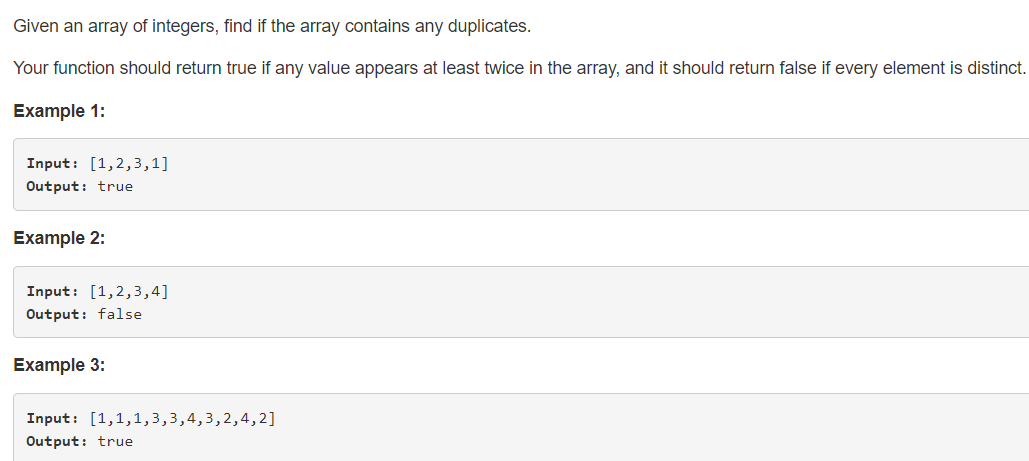一、题目
1、审题

2、分析
判断一个数组中是否有重复的元素
二、解答
1、思路:
方法一、
先排序,在判断
1 public boolean containsDuplicate(int[] nums) { 2 3 Arrays.sort(nums); 4 for (int i = 1; i < nums.length; i++) { 5 if(nums[i] == nums[i - 1]) 6 return true; 7 } 8 return false; 9 }
方法二、
使用优先队列 PriorityQueue 对数组进行排序
1 public boolean containsDuplicate2(int[] nums) { 2 3 PriorityQueue<Integer> queue = new PriorityQueue<>(); 4 for(int i: nums) 5 queue.offer(i); 6 int tmp = -1; 7 while(!queue.isEmpty()) { 8 int cur = queue.poll(); 9 if(cur == tmp) 10 return true; 11 tmp = cur; 12 } 13 return false; 14 }
方法三、
使用选择排序对数组进行排序,在判断。
注意: 为了提高选择排序的效率(即避免基本有序时的最坏情况),可以先对数组元素进行乱序。
1 public boolean containsDuplicate3(int[] nums) { 2 3 shuffle(nums); 4 int low = 0, high = nums.length - 1; 5 selectionSort(nums, low, high); 6 for (int i = 1; i < nums.length; i++) { 7 if(nums[i] == nums[i - 1]) 8 return true; 9 } 10 return false; 11 } 12 13 private void shuffle(int[] nums) { 14 Random random = new Random(); 15 for (int i = 1; i < nums.length; i++) { 16 int r = random.nextInt(i + 1); 17 exchange(nums, i, r); 18 } 19 } 20 21 private void selectionSort(int[] nums, int low, int high) { 22 23 if(low >= high) 24 return; 25 int i = low, j = high + 1; 26 while(i < j) { 27 while((i + 1 <= high) && nums[++i] < nums[low]); // 从左向右找比 low 大的 28 while((j - 1 >= low) && nums[low] < nums[--j]); // 从右向左找比 low 小的 29 if(i < j) 30 exchange(nums, i, j); 31 else 32 break; 33 } 34 exchange(nums, low, j); 35 selectionSort(nums, low, j - 1); 36 selectionSort(nums, j + 1, high); 37 } 38 private void exchange(int[] nums, int i, int j) { 39 int tmp = nums[i]; 40 nums[i] = nums[j]; 41 nums[j] = tmp; 42 }